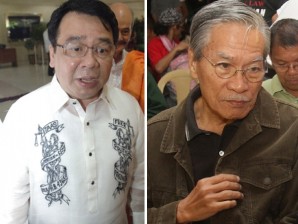
Bayan Muna representative Neri Colmenares and Bayan Muna president Satur Ocampo. INQUIRER FILE PHOTO
MANILA, Philippines — Members of militant groups held rallies in front of the Commission on Elections (Comelec) main office in Intramuros Monday morning to decry what they described as moves by the poll body to disqualify multisectoral parties, particularly Bayan Muna and Anakpawis.
Bayan Muna representative Neri Colmenares and Bayan Muna president Satur Ocampo went to the poll body’s office and held a dialogue with Comelec Chairman Sixto Brillantes to seek clarification of the said moves.
Both Ocampo and Colmenares clarified that they were in support of the Comelec’s efforts to cleanse the party-list system of fake partly-list groups formed by multi-millionaires and political dynasties.
“But we take exception to the idea to disqualify “multi-sectoral” party even if that party has been proven to be truly representing marginalized sectors,” said Ocampo.
Colmenares, for his part, said that Comelec should concentrate on efforts to rid the system wherein the rich and members of political dynasties were made to represent marginalized sectors.
Meanwhile, Vencer Crisostomo, Anakbayan chairperson, called on Comelec not to hold “double-standards” in their purging system, saying that “Malacañang-backed partylists should also be disqualified.” He named the said partylists as Akbayan, Citizen’s Action Party, Black and White Movement, among others.
He said they were troubled by statements reportedly made by Brillantes saying that Akbayan would still qualify as a party-list representing a marginalized sector even though it has members appointed by the administration.
“Wala po sanang special treatment for Malacañang-backed partylists…Kaduda-duda ang paglilinis kung hindi sila maisasama sa matatanggal (There should be no special treatment for Malacañang-backed partylists…the purging should be doubtful if these groups will not be disqualified too),” he said.
The Comelec has been undergoing a re-evaluation of old and new party-list groups and a screening of their nominees under the law as part of their efforts to cleanse the party-list system, which has been criticized as being dominated by bogus organizations or by groups whose nominees are either multimillionaires, former government officials or members of powerful political clans.
Under Republic Act No. 7941 or the Party-list System Act, only 12 marginalized and underrepresented sectors of society can seek congressional representation.
These are the labor, peasant, fisher folk, urban poor, indigenous cultural communities, elderly, handicapped, women, youth, veterans, overseas workers and professionals sectors.